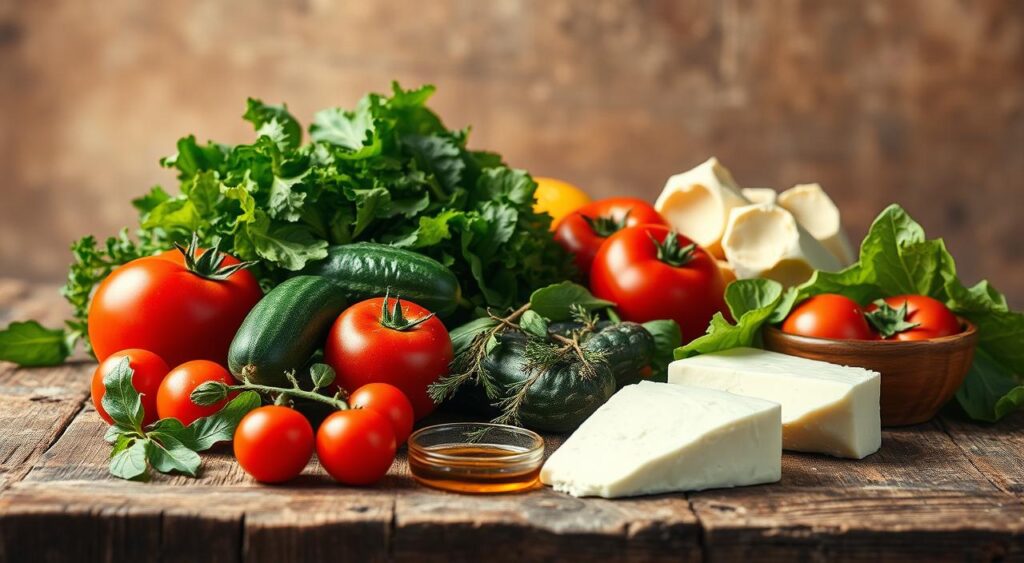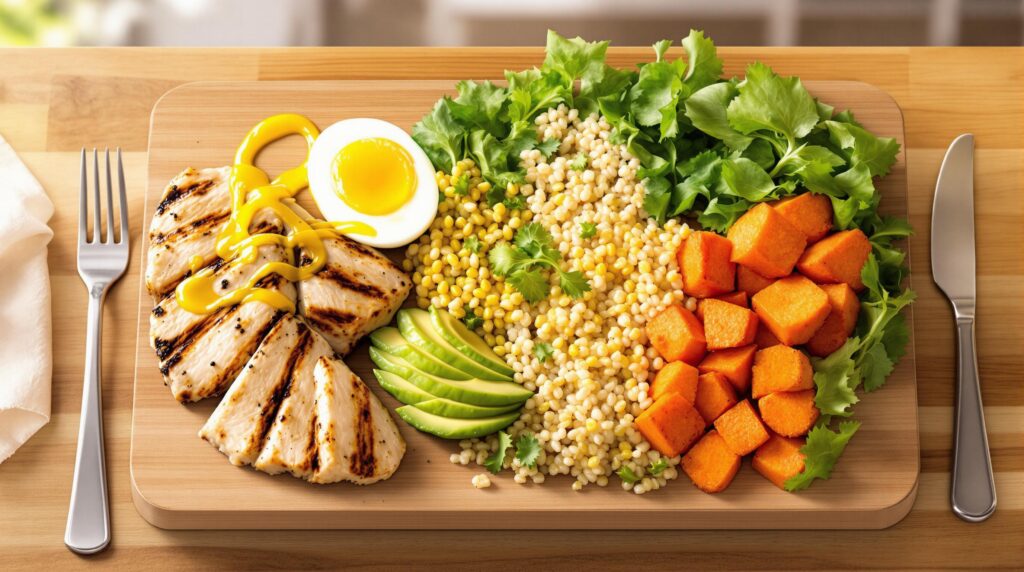Imagine finding a tasty way to keep your heart healthy and boost your overall well-being. The Mediterranean diet is more than just a diet. It’s a way of life that connects you to centuries of health wisdom. Your path to better heart health begins here.
Heart disease is a big problem in the US, but the Mediterranean diet offers a natural solution. It’s not just about food; it’s a complete approach to health based on traditional Mediterranean cooking.
The World Health Organization calls this diet a top nutritional strategy. It focuses on whole foods, healthy fats, and plants. This diet gives you a list of foods to naturally lower cholesterol and improve heart health.
Your Mediterranean diet staples will fight against heart disease risks. You’ll eat fresh veggies, whole grains, lean proteins, and olive oil. These foods help your body heal and support long-term health.
Are you ready to find a tasty way to heart health? Let’s explore the Mediterranean diet. See how easy changes in your diet can greatly improve your life.
Introduction to the Mediterranean Diet
Imagine a diet that’s not just about eating, but about embracing a whole new way of life. The Mediterranean diet is exactly that—a delicious approach to nutrition that goes far beyond typical meal plans. It celebrates healthy mediterranean ingredients with vibrant flavors and simple cooking techniques.
At its core, the Mediterranean diet is a lifestyle that prioritizes whole, unprocessed foods. It’s less about strict restrictions and more about enjoying nutritious, flavorful meals. You’ll find this approach packed with:
- Fresh fruits and vegetables
- Whole grains
- Lean proteins
- Healthy fats like olive oil
What makes this diet truly special is its flexibility. Unlike rigid diet plans, Mediterranean meal ideas can be adapted to your personal taste and local ingredients. The focus is on quality and enjoyment of food, not counting calories or feeling deprived.
“Eating is a pleasure to be celebrated, not a chore to endure.” – Mediterranean Diet Philosophy
Whether you’re looking to improve heart health, manage weight, or simply enjoy more delicious meals, the Mediterranean diet offers a refreshing and sustainable approach to nutrition. It can transform your relationship with food.
Benefits of the Mediterranean Diet for Heart Health
Protecting your heart starts with what you eat. The Mediterranean diet is a powerful way to keep your heart healthy. Studies show it can greatly lower your risk of heart disease.
Scientific studies have shown the diet’s heart-protective qualities. The foods in the Mediterranean diet work together to support heart health. They do this in several ways:
- Reducing inflammation in blood vessels
- Lowering bad cholesterol levels
- Improving blood pressure regulation
- Enhancing overall heart muscle function
Your heart benefits from the diet’s rich nutrients. Foods like olive oil, nuts, fish, and vegetables are heart-friendly. They help fight cardiovascular risks.
| Nutrient | Heart Health Benefit |
|---|---|
| Omega-3 Fatty Acids | Reduces triglycerides, decreases blood pressure |
| Antioxidants | Prevents oxidative stress in heart tissues |
| Fiber | Lowers cholesterol, supports healthy circulation |
Sticking to this diet long-term can greatly improve your heart health. Researchers found that people on the Mediterranean diet have up to a 30% lower risk of heart attacks and strokes.
Key Components of the Mediterranean Diet
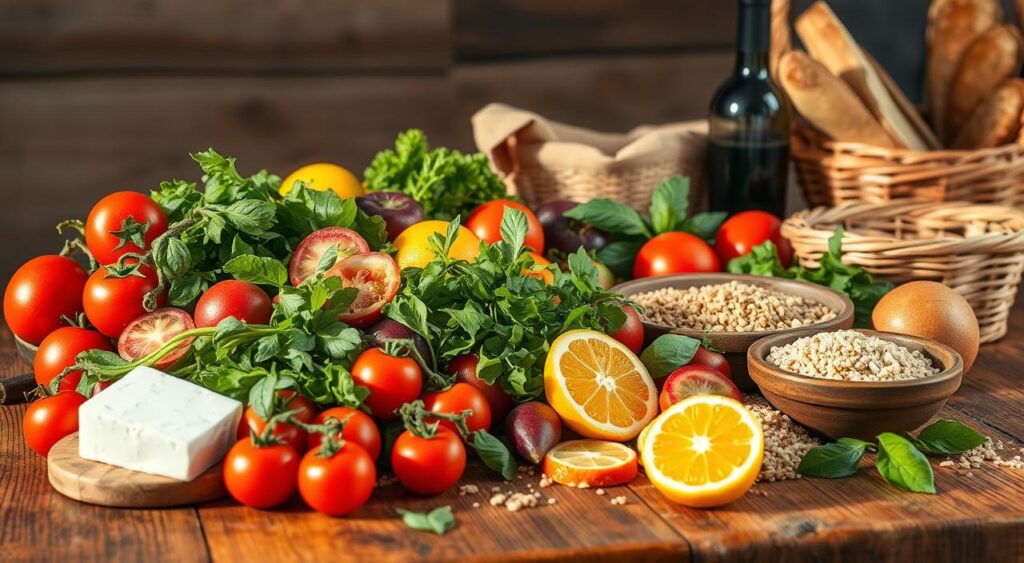
Exploring the Mediterranean diet isn’t about picking random foods. It’s about choosing whole, nutrient-rich foods. These foods help keep your heart healthy and support your overall well-being.
At the heart of this diet are several key elements. They make the Mediterranean diet unique and effective:
- Daily Essentials: Vegetables, fruits, whole grains, and healthy fats are the base of your diet
- Protein Sources: Fish, poultry, beans, and eggs offer important nutrients
- Dairy: Enjoy moderate amounts of cheese and yogurt
- Red Meat: Eat it only a few times a month
The Mediterranean diet is simple and flexible. It focuses on plant-based foods, lean proteins, and healthy fats like olive oil. It’s not about strict rules but about enjoying a healthy eating pattern.
“Let food be thy medicine and medicine be thy food” – Hippocrates
Your grocery list for the Mediterranean diet should include fresh, unprocessed foods. Choose colorful vegetables, fresh fruits, whole grains, nuts, and seeds. These foods together make a diet rich in nutrients. They support your heart health and overall well-being.
Mediterranean Diet Foods List
Exploring the Mediterranean diet foods list shows a vibrant, nutritious way to eat. It can greatly improve your health. Start by learning about the key food groups in the Mediterranean diet.

The Mediterranean diet focuses on whole, unprocessed foods. These foods are full of nutrients. Your meals will be colorful and support your health and heart.
Vegetables and Fruits: Nature’s Nutritional Powerhouses
Vegetables and fruits are at the top of your Mediterranean diet list. They are packed with nutrients:
- Dark leafy greens like spinach and kale
- Vibrant bell peppers
- Tomatoes
- Citrus fruits
- Berries
- Seasonal produce
Whole Grains: The Foundation of Healthy Eating
Whole grains are key in the Mediterranean diet. They offer important nutrients and fiber:
- Quinoa
- Brown rice
- Whole wheat bread
- Barley
- Oats
Healthy Fats: Nourishing Your Body
Healthy fats are essential in the Mediterranean diet:
- Extra virgin olive oil
- Avocados
- Nuts and seeds
Lean Proteins: Supporting Muscle and Health
Your protein sources should be lean and varied:
- Fish (salmon, sardines)
- Legumes
- Poultry
- Eggs
Adding these foods to your diet will help you enjoy the Mediterranean diet’s health benefits.
Mediterranean Diet Staples to Stock Up On
Turning your kitchen into a heart-healthy space starts with knowing the key foods of the Mediterranean diet. Your pantry and fridge can help keep your heart healthy with the right food choices.
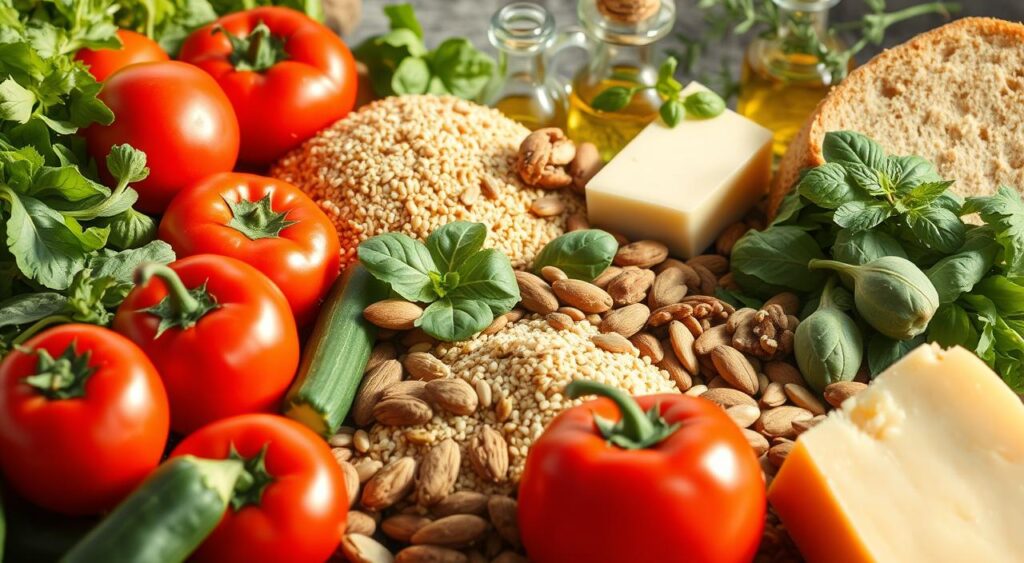
Choosing the right Mediterranean foods is important. Let’s look at the main ingredients for a heart-healthy diet.
Essential Mediterranean Ingredients
Your Mediterranean diet starts with these basic items:
- Extra Virgin Olive Oil: The heart-protective liquid gold of Mediterranean cooking
- Fresh Vegetables and Fruits: Colorful, nutrient-rich foods that are the base of meals
- Whole Grains: Quinoa, brown rice, and whole wheat bread for lasting energy
- Legumes: Beans, lentils, and chickpeas, full of plant-based protein
Popular Mediterranean Diet Foods
Make your meals vibrant and tasty with these Mediterranean favorites:
| Food Item | Nutritional Benefit | Serving Suggestion |
|---|---|---|
| Greek Yogurt | Probiotic-rich protein source | Breakfast topping or snack |
| Fatty Fish | Omega-3 fatty acids for heart health | Grilled salmon or sardines |
| Hummus | Plant-based protein and healthy fats | Dip or sandwich spread |
“Let food be thy medicine and medicine be thy food” – Hippocrates
By picking these Mediterranean diet staples, you’ll build a healthy base for your heart. Remember, variety and freshness are key to enjoying this tasty and healthy diet.
Creative Mediterranean Meal Ideas
Exploring Mediterranean meal ideas can change your eating habits and boost heart health. The Mediterranean diet is a fun way to eat healthy. It makes meals both tasty and fulfilling.
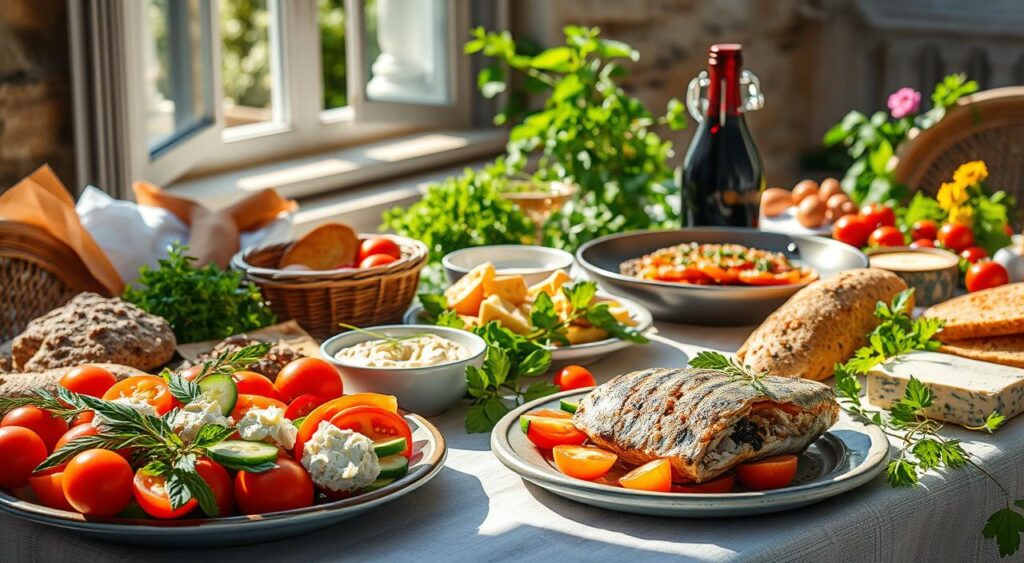
Starting your heart-healthy eating journey is easy. It’s all about making meals that are good for you and delicious. Healthy Mediterranean ingredients are the key to these tasty dishes.
Breakfast Options to Start Your Day Right
- Greek Yogurt Parfait: Layer creamy Greek yogurt with fresh berries and a sprinkle of chopped nuts
- Whole grain toast topped with mashed avocado and a drizzle of olive oil
- Steel-cut oats with fresh figs and a honey glaze
Lunch and Dinner Suggestions Packed with Flavor
Mediterranean meals are at their best when they mix vibrant ingredients with simple cooking. This makes them both tasty and easy to make.
- Bulgur wheat salad with roasted vegetables and feta cheese
- Grilled fish with herb-roasted Mediterranean vegetables
- Chickpea and spinach stew served over quinoa
“Eating should be a pleasure, not a punishment. The Mediterranean diet proves that healthy food can be incredibly delicious.” – Nutritionist Expert
For quick snacks, try hummus with raw veggies, a handful of almonds, or fresh fruit. These snacks are not only healthy but also delicious.
Grocery List for Mediterranean Eating
Creating a Mediterranean diet grocery list is easy. Start your heart-healthy eating journey by picking the best foods. Choose nutrient-rich ingredients to make your kitchen a Mediterranean wellness hub.
- Fresh Produce
- Leafy greens (spinach, kale)
- Colorful vegetables (bell peppers, tomatoes)
- Seasonal fruits (oranges, berries)
- Whole Grains
- Quinoa
- Brown rice
- Whole wheat bread
- Healthy Proteins
- Wild-caught salmon
- Chickpeas
- Lentils
When making your Mediterranean diet grocery list, choose fresh, unprocessed foods. Look for extra virgin olive oil, nuts like almonds and walnuts, and herbs like basil and oregano. These foods are tasty and good for your heart.
Pro tip: Shop the perimeter of the grocery store for the freshest, most nutritious options.
Your Mediterranean eating plan should include variety and quality. Opt for organic when you can. Don’t hesitate to try new ingredients that bring Mediterranean cuisine to life.
Foods to Limit on the Mediterranean Diet
The Mediterranean diet is all about eating right. It’s important to know which foods to cut down on for heart health. Your diet should include foods that are good for you.
Knowing which foods to limit helps you make better choices. The Mediterranean diet focuses on whole, unprocessed foods over processed ones.
- Processed Meats: Bacon, sausages, and high-sodium deli meats
- Refined Grains: White bread, pasta made from refined flour
- Added Sugar Products: Soft drinks, candies, pastries
- Unhealthy Fats: Trans fats, hydrogenated oils
You don’t have to stop eating these foods completely. The Mediterranean diet is about balance. Choose whole foods over processed ones to keep your body healthy.
“Eating is a necessity, but cooking is an art” – Mediterranean dietary wisdom
When you look at your diet, pick foods that are full of nutrients. Instead of processed snacks, eat nuts. Drink water or herbal tea instead of sugary drinks. Choose whole grains over refined carbs.
By making these changes, your heart will be grateful.
Conclusion
The Mediterranean diet is more than just food—it’s a way to live healthier. By using a detailed Mediterranean diet foods list, you can make lasting changes. These changes help your heart stay healthy naturally.
Starting to eat like the Mediterranean doesn’t mean changing your whole life. Begin by adding whole grains, fresh veggies, lean proteins, and healthy fats to your meals. This way, you enjoy foods that are good for you. Check out this comprehensive Mediterranean diet grocery list to help you get started.
But diet is only part of staying heart-healthy. Also, make sure to exercise regularly, manage stress, and get health check-ups. Your heart will be grateful for these changes. You might also feel more energetic, healthier, and enjoy food more.
Choose this heart-friendly way of living. Your future self will thank you for the effort you put into your health today.

